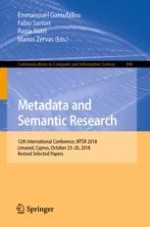This book constitutes the thoroughly refereed proceedings of the 12th International Conference on Metadata and Semantic Research, MTSR 2018, held in Limassol, Cyprus, on October 23-26, 2018.
The 19 full and 16 short papers presented were carefully reviewed and selected from 77 submissions. The papers are organized in topical sections on metadata, linked data, semantics, ontologies and SKOS; digital libraries, information retrieval, big, linked, social and open data; cultural collections and applications; Knowledge IT Artifacts (KITA) in professional communities and aggregations; Digital Humanities and Digital Curation (DHC); European and national projects; agriculture, food and environment; open repositories, research information systems and data infrastructures.
